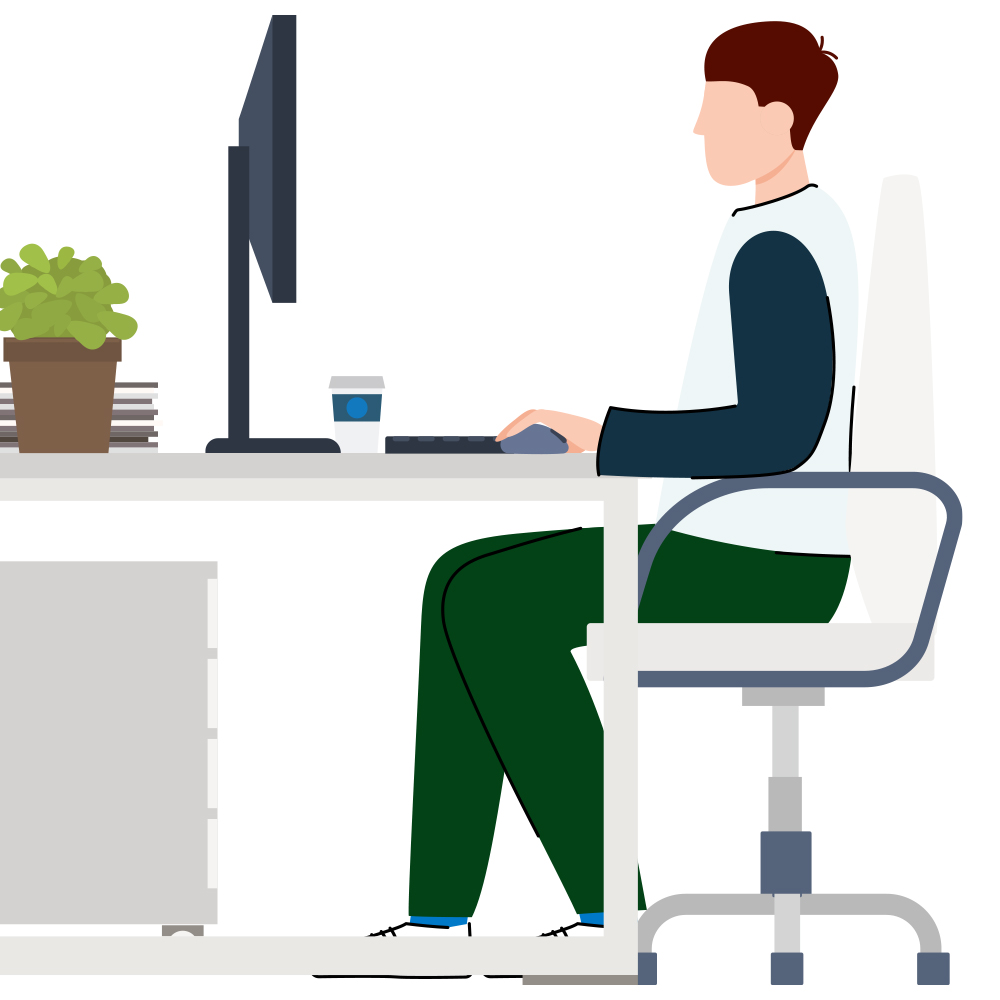7 tips to look after your health while working from home
Whether you’re new to working from home or you’ve been doing it for a while, it’s important to think about how it affects your wellbeing. Here, I share some tips and tricks to look after your health and make working from home work for you.

How does working from home affect your health?
You might find that your daily habits and working patterns change, depending on the environment you work in.
For example, if you work from home, you won’t have the natural routine of an office environment. It might be tempting to work from your sofa, rather than from a desk. Or you might start working soon after you wake up, since you don’t have to commute.
When you work from home, it can also affect your work-life balance. It might give you the flexibility you need to arrange childcare or healthcare appointments and save you time on commuting. But when your home is also your office, you might find it hard to separate work and home responsibilities.
Keeping a healthy work-life balance is important to looking after yourself. It can mean, you:
- meet deadlines at work and still have free time to enjoy socialising or hobbies
- eat and sleep well
- don’t worry about work when you’re not working
Thinking about how you work while at home can help you keep this balance. And focusing on your mental and physical health is an important part of this.
How to look after your health while working from home?
There are many steps you can take to look after your physical and mental wellbeing while you work remotely. Here are some of my top tips.
1. Stay motivated
One of the main things you might struggle with when working remotely is staying motivated. We all go through highs and lows throughout the day, but working from home can give you more flexibility to schedule your tasks accordingly. By scheduling tasks around your productive hours, you might find you work more efficiently and stay motivated.
Keeping a routine can also make it easier to mentally get into ‘work’ mode when you work from home.
Everybody is different, and that relates to your working habits too. For example, if you naturally wake up early, you might find that you’re most productive in the mornings. If that’s the case, you could try to block off time in your calendar so it doesn’t get taken up by meetings.
2. Sort out your setup
Your posture while working should be comfortable and sustainable, as shown in this image. Your seat should be close to your desk or table, and your feet fully on the floor. Keep your shoulders relaxed and your elbows at a 90-degree angle just above the table top.

While it might be more comfortable to work from the sofa in the short-term, this provides little support. Ideally, you should try to work from a table or desk that’s at elbow height and use a chair that supports your lower back.
The top of your laptop screen or monitor should be level with your eyes. Adjustments like these will help you have good posture. You could also try some stretches while sitting at your computer to reduce aches and pains.
3. Take breaks
Even with a comfortable setup, it’s still good to take time away from your computer. Try to take short, regular breaks to stretch your legs and to give your eyes a rest from the screen.
If you can schedule meetings to end a few minutes early, this can give you a chance to take a break. Taking breaks can also improve your mood and productivity levels. You could even schedule them into your calendar, so you’re prompted by reminders.
You might find the Pomodoro technique useful. This technique encourages regular breaks between short periods of focus, which can help you structure your time.
4. Keep active
Exercise is good for your physical and mental health, and you should aim to do at least 150 minutes of moderate intensity exercise each week. Although that may sound like a lot, if you incorporate half an hour of exercise into each work day, you’ll meet that goal.
Working from home might give you some more flexibility around when you can exercise. Perhaps you could go for a swim or a jog before work, instead of commuting?
5. Eat well
As well as being active, eating a healthy balanced diet can help keep you well. But it can be hard to eat healthily when there’s so much choice within reach. You may be tempted to grab something quick from the fridge or graze on snacks from the cupboard while you work.
Try to prepare a healthy lunch and keep snacks away from your work area, if you can, as this might lead to mindless eating.
6. Stay connected
Working from home often means working alone. And while that may help you focus and increase your productivity, you might miss the social connection of having colleagues around you. These social connections can prevent you from feeling lonely or isolated.
Although going for a coffee together may not be feasible, you could schedule a ‘virtual’ coffee with a colleague instead. Or if you’re tired of video calls, your video conferencing software might have an instant messaging function you could use to chat to colleagues.
7. Maintain boundaries
While you’re working from home, it’s important to create a distinction between your work and your free time. This can help to prevent burnout.
Setting boundaries can help you switch off from work, and a routine can help you get into ‘work mode’. For example, you could turn your laptop off at the end of the day or wear work clothes during work hours.
Going for a short walk before and after work can also help create the structure of a working day. You could try practicing mindfulness, which can help you be more aware of your feelings and your surroundings.
Do you know how healthy you truly are? Bupa health assessments give you a clear overview of your health and a view of any future health risks. You'll receive a personal lifestyle action plan with health goals to reach for a happier, healthier you.
-
Sources Sources
- Managing home workers’ health and safety. Health and Safety Executive. hse.gov.uk, accessed January 2023
- Good posture when using display screen equipment. Health and Safety Executive. hse.gov.uk, accessed January 2023
- Working safely with display screen equipment. Health and Safety Executive. hse.gov.uk, accessed January 2023
- Eye safety. Royal National Institute of Blind People. rnib.org.uk, accessed January 2023
- Give me a break. American Psychological Association. apa.org, published January 2019
- Work-life balance. Mental Health Foundation. mentalhealth.org.uk, last updated September 2021
- Physical activity. World Health Organization. who.int, reviewed October 2022
- Workers are less productive working remotely (at least that’s what their bosses think). Forbes. forbes.com, published November 2022
- 3 tips to avoid WFH burnout. Harvard Business Review. hbr.org, published 3 April 2020
- Dealing with burnout while working from home. Mind. mind.org.uk, accessed 1 February 2023
- Holt-Lunstad J. Loneliness and Social Isolation as Risk Factors: The Power of Social Connection in Prevention. Am J Lifestyle Med 2021;15:567-73. doi: 10.1177/15598276211009454
- How to look after your mental health using mindfulness. Mental Health Foundation. mentalhealth.org.uk, accessed February 2023
- Mindfulness. Mind. mind.org.uk, published November 2021
- The Pomodoro Technique Explained. Forbes. forbes.com, March 2020
- Rudnicka A, Newbold JW, Cook D, Cecchinato ME, Gould S, Cox AL. Eworklife: Developing effective strategies for remote working during the COVID-19 pandemic. The New Future of Work Online Symposium 2020
About our health information
At Bupa we produce a wealth of free health information for you and your family. This is because we believe that trustworthy information is essential in helping you make better decisions about your health and wellbeing.
Our information has been awarded the PIF TICK for trustworthy health information. It also follows the principles of the The Information Standard.

More mental health and wellbeing articles
Did you find our advice helpful?
We’d love to hear what you think. Our short survey takes just a few minutes to complete and helps us to keep improving our healthy lifestyle articles.
Legal disclaimer
This information was published by Bupa's Health Content Team and is based on reputable sources of medical evidence. It has been reviewed by appropriate medical or clinical professionals and deemed accurate on the date of review. Photos are only for illustrative purposes and do not reflect every presentation of a condition.
Any information about a treatment or procedure is generic, and does not necessarily describe that treatment or procedure as delivered by Bupa or its associated providers.
The information contained on this page and in any third party websites referred to on this page is not intended nor implied to be a substitute for professional medical advice nor is it intended to be for medical diagnosis or treatment. Third party websites are not owned or controlled by Bupa and any individual may be able to access and post messages on them. Bupa is not responsible for the content or availability of these third party websites. We do not accept advertising on this page.







